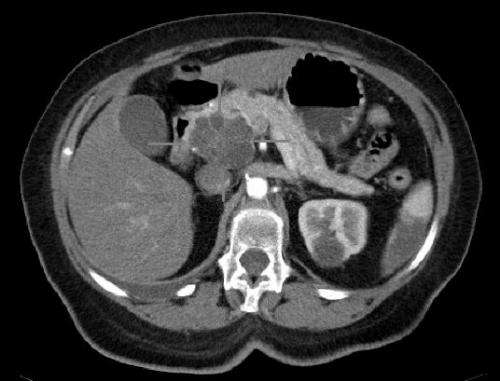#Study finds combination therapy suppresses pancreatic tumor growth in mice

“#Study finds combination therapy suppresses pancreatic tumor growth in mice”

UCLA Jonsson Comprehensive Cancer Center researchers have uncovered a potential new way to target pancreatic tumors that express high intratumoral interferon signaling (IFN). The team found that high type I IFN signaling is present in a subset of pancreatic tumors and it triggers a decrease in the level of NAD and NADH in pancreatic cancer cells, which are vital cofactors in critical metabolic processes.
After the researchers delineated the mechanism by which the NAD depletion occurs, they demonstrated that cells with high IFN signaling were more sensitive to NAMPT inhibitors, which inhibit a major pathway in NAD synthesis. Based on this mechanism, recently developed second-generation NAMPT inhibitors could potentially be used in combination with new systemic drugs, called STING agonists, which increase type I IFN signaling. When tested in mice, the combination of IFN signaling and NAMPT inhibitors not only decreased pancreatic tumor growth, but also resulted in fewer liver metastases.
“With the advent of these two new and improved therapeutics, our findings are timely as their combination may sensitize tumors to NAD depletion,” said lead author Dr. Alexandra Moore, a resident physician in the department of surgery at the David Geffen School of Medicine at UCLA.
Pancreatic cancer continues to be one of the most difficult cancers to treat. One of the hallmarks of the disease is its extensively reprogrammed metabolic network. All cells, including cancer cells, have the need to transform nutrients from the environment into building blocks for cellular processes and many of these processes require NAD or NADH as a vital cofactor. This research focused on harnessing IFN-induced NAD depletion in combination with the inhibition of NAD synthesis to develop new approaches to better treat pancreatic cancer.
The team first used cell lines and cell culture to determine the mechanism of NAD depletion induced by IFN signaling by looking at the mRNA levels of NAD-consuming enzymes after treatment with IFN. There was an increase in mRNA levels as well as protein expression of PARP9, PARP10, and PARP14. After confirming the findings, the team translated the research into an in vivo model. Researchers used two different mouse models and injected cancer cells into the pancreas of mice prior to treatment.
The findings provide evidence that if tumors with high IFN signaling can be identified, or if IFN signaling can be amplified in tumor cells, those tumors may have greater sensitivity to treatment with NAMPT inhibitors. If so, the combination could potentially help improve the prognosis for one of the most difficult cancers to treat.
“This is a study that identifies a potential vulnerability created by type I IFNs in pancreatic cancer that can be leveraged for what appears to be an effective therapeutic strategy,” said senior author Dr. Timothy Donahue, professor of surgery and chief of surgical oncology.
The study was published online in the Proceedings of the National Academy of Sciences.
Disrupting the cellular process that promotes pancreatic cancer’s deadly growth
Alexandra M. Moore et al, NAD+ depletion by type I interferon signaling sensitizes pancreatic cancer cells to NAMPT inhibition, Proceedings of the National Academy of Sciences (2021). DOI: 10.1073/pnas.2012469118
Citation:
Study finds combination therapy suppresses pancreatic tumor growth in mice (2021, February 18)
retrieved 18 February 2021
from https://medicalxpress.com/news/2021-02-combination-therapy-suppresses-pancreatic-tumor.html
This document is subject to copyright. Apart from any fair dealing for the purpose of private study or research, no
part may be reproduced without the written permission. The content is provided for information purposes only.
If you liked the article, do not forget to share it with your friends. Follow us on Google News too, click on the star and choose us from your favorites.
For forums sites go to Forum.BuradaBiliyorum.Com
If you want to read more Like this articles, you can visit our Science category.



